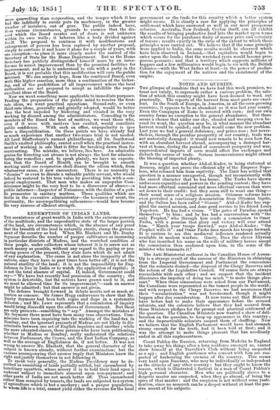REDEMPTION OF INDIAN LANDS.
THE coexistence of great wealth in India with the extreme poverty of the multitude, and the unproductive state of the larger portion of the land, are circumstances which, in the absence of any proof that the breadth of the land is naturally sterile, stamp the govern- ment of the country as bad. When Mr. Blackett and Mr. Denby Seymour describe the number of pauper cultivators as increasing in particular districts of Madras, and the wretched condition of 1 those people, under collectors whose interest it is to screw out as ' much money as possible, without any regard to the paying or pro- ducing power of the peasant, they state facts which do not admit of any explanation. The cause is not alone the incapacity of the natives' since they have in past times been better off; it is not the natural sterility of the land; it is not the impossibility for Eng- lishmen to live in India or to watch the application of capital; it is not the total absence of capital. If, indeed, Government could say" We have but recently had possession of the country ; the system is detestable, but the natives have grown used to it, and we must be allowed time for its improvement,"—such an answer might be admitted; but that answer is not given.
The defence brought forward in debate merits not so much at- tention as censure. Sir Tames Hogg endeavours to show that Mr. Denby Seymour had been both rogue and dupe in a systematic delusion ; and Mr. Lowe represents that a commission of inquiry would bring discredit upon the officers of Government. But these are only pretexts—something to " say." Amongst the mistakes of Mr. Seymour there must have been many true observations. Com- missions have been inquiring into the working of the land-tax in Bombay, and the ignorant peasants of Madras are not likely to dis- criminate between one set of English inquiries and another ; while the more educe.ted classes, those persons who have been petitioning,. whether in 'Madras or Bombay, really understand the relations between Parliament, the Crown, and the East Indian Company, as well as the average of Englishmen do, if not better. It was not wrong to answer Mr. Blackett, that the general character of the subject is known already, without further examination; but the excuses accompanying that answer imply that Ministers know the right and justify themselves in not following it. To speak very generally, the Madras Presidency may be de- scribed as 'consisting of lands partially settled, but encumbered by hereditary squatters, whose misery it is to hold their land upon a rackrent subject to immediate removal upon non-payment; and other parts of India are not much better off. Thus encumbered rather than occupied by tenants, the lands are subjected to a system of agriculture which is but a mockery ; and a pauper population, to Whom life is a trial, cannot yield either the revenue for the local government or the trade for this country which a better system might create. It is clearly a ease for applying the principles of settlement which have answered so well in our most prosperous colonies. Australia, New Zealand, Ceylon itself, can all exhibit the results of bringing productive land into the market upon terms which secure for the purchaser fixity of money price and certainty of tenure; results exactly in the ratio of the extent to which those principles were carried out. We believe that if the same principle were applied to India, the same results would be observed which have been observed in Ireland,—that capitalists would begin to enter upon the lands; that the wretched ryots would become pros- perous peasants ; and that a territory which supports millions of beggars and a few millionaires would begin to vie with the British Colonies—with the West Indies at least—in the power of produc- tion for the enjoyment of the natives and the enrichment of the empire.


























 Previous page
Previous page